Analyzing the Interrelation of Business Strategy and Economics
VerifiedAdded on 2022/08/31
|6
|1375
|21
Essay
AI Summary
This essay critically examines the interrelation between the development of international business strategies and economics. It emphasizes the increasing globalization and its impact on organizational business, highlighting the role of international business activities, including dealing with foreign employees, governments, consumers, and stakeholders. The essay discusses various international business strategies, such as international, global, multi-domestic, and transnational, and how economic health, including factors like income, inflation, recession, interest rates, and exchange rates, directly influences a business's sustainability and profitability. It explains the importance of considering factors like GDP, exchange rates, and supply chain management when forming international business strategies, concluding that economic conditions are a major external environmental factor in driving business success and expansion globally. The essay also references various academic sources to support its arguments.
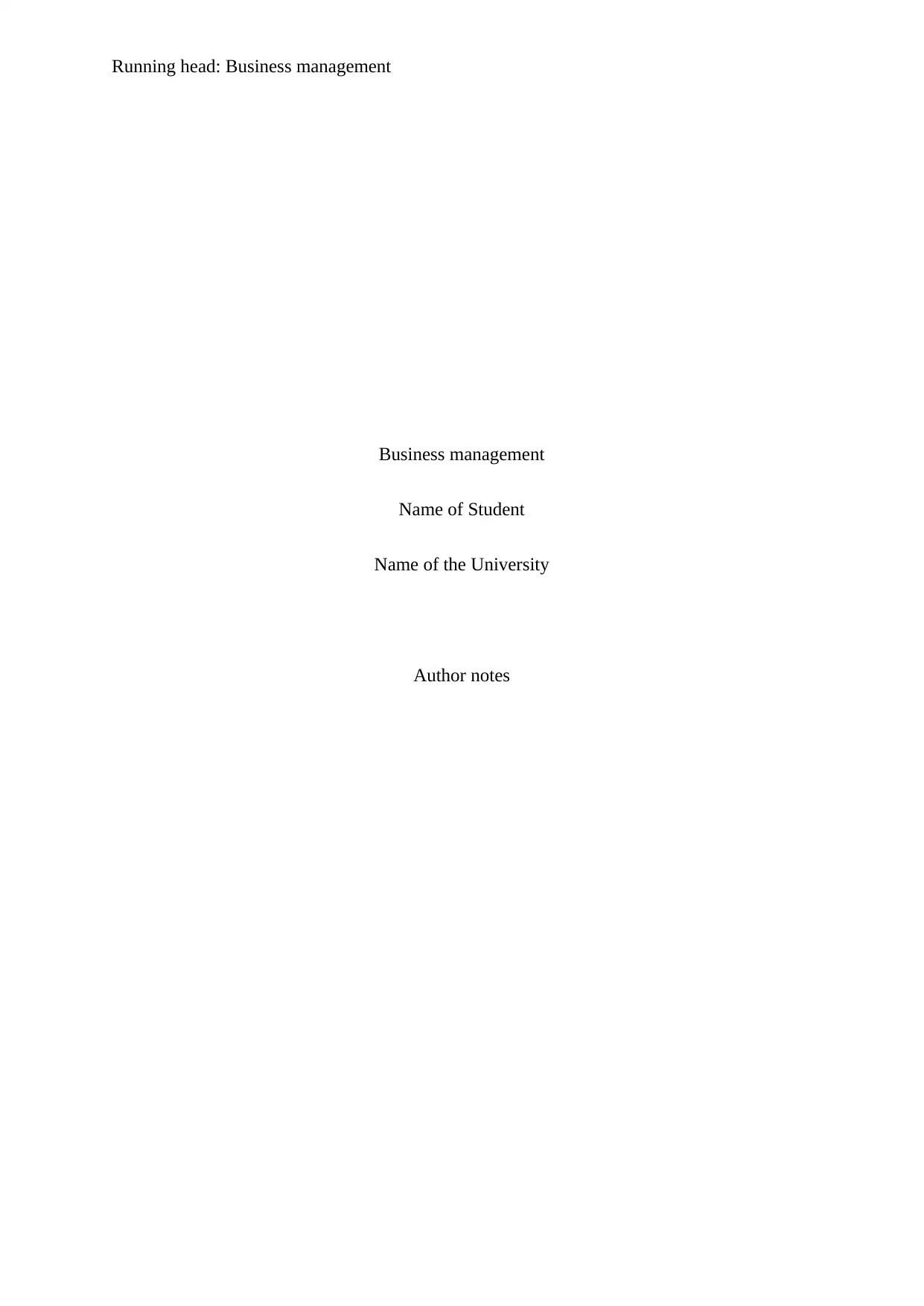
Running head: Business management
Business management
Name of Student
Name of the University
Author notes
Business management
Name of Student
Name of the University
Author notes
Paraphrase This Document
Need a fresh take? Get an instant paraphrase of this document with our AI Paraphraser
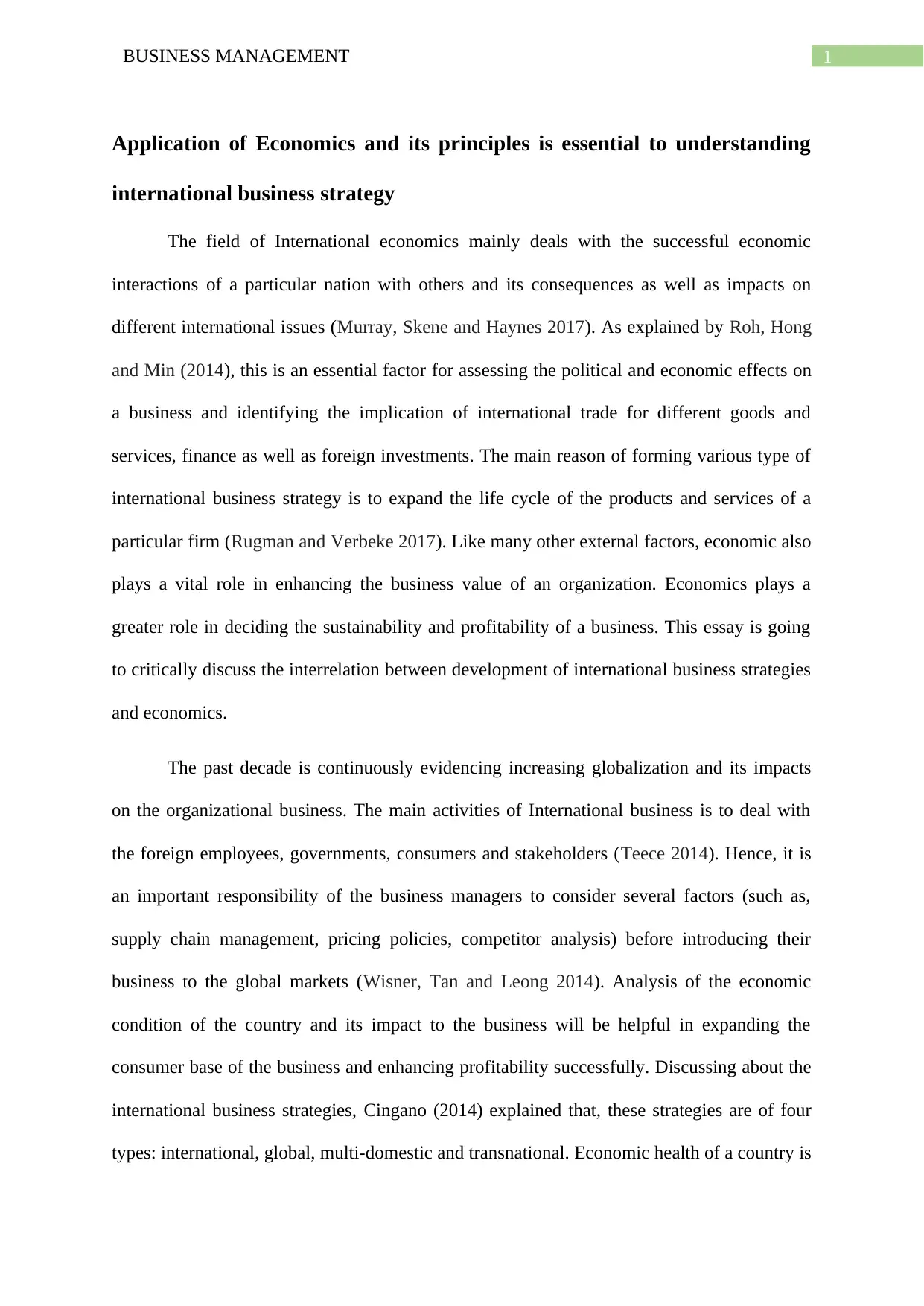
1BUSINESS MANAGEMENT
Application of Economics and its principles is essential to understanding
international business strategy
The field of International economics mainly deals with the successful economic
interactions of a particular nation with others and its consequences as well as impacts on
different international issues (Murray, Skene and Haynes 2017). As explained by Roh, Hong
and Min (2014), this is an essential factor for assessing the political and economic effects on
a business and identifying the implication of international trade for different goods and
services, finance as well as foreign investments. The main reason of forming various type of
international business strategy is to expand the life cycle of the products and services of a
particular firm (Rugman and Verbeke 2017). Like many other external factors, economic also
plays a vital role in enhancing the business value of an organization. Economics plays a
greater role in deciding the sustainability and profitability of a business. This essay is going
to critically discuss the interrelation between development of international business strategies
and economics.
The past decade is continuously evidencing increasing globalization and its impacts
on the organizational business. The main activities of International business is to deal with
the foreign employees, governments, consumers and stakeholders (Teece 2014). Hence, it is
an important responsibility of the business managers to consider several factors (such as,
supply chain management, pricing policies, competitor analysis) before introducing their
business to the global markets (Wisner, Tan and Leong 2014). Analysis of the economic
condition of the country and its impact to the business will be helpful in expanding the
consumer base of the business and enhancing profitability successfully. Discussing about the
international business strategies, Cingano (2014) explained that, these strategies are of four
types: international, global, multi-domestic and transnational. Economic health of a country is
Application of Economics and its principles is essential to understanding
international business strategy
The field of International economics mainly deals with the successful economic
interactions of a particular nation with others and its consequences as well as impacts on
different international issues (Murray, Skene and Haynes 2017). As explained by Roh, Hong
and Min (2014), this is an essential factor for assessing the political and economic effects on
a business and identifying the implication of international trade for different goods and
services, finance as well as foreign investments. The main reason of forming various type of
international business strategy is to expand the life cycle of the products and services of a
particular firm (Rugman and Verbeke 2017). Like many other external factors, economic also
plays a vital role in enhancing the business value of an organization. Economics plays a
greater role in deciding the sustainability and profitability of a business. This essay is going
to critically discuss the interrelation between development of international business strategies
and economics.
The past decade is continuously evidencing increasing globalization and its impacts
on the organizational business. The main activities of International business is to deal with
the foreign employees, governments, consumers and stakeholders (Teece 2014). Hence, it is
an important responsibility of the business managers to consider several factors (such as,
supply chain management, pricing policies, competitor analysis) before introducing their
business to the global markets (Wisner, Tan and Leong 2014). Analysis of the economic
condition of the country and its impact to the business will be helpful in expanding the
consumer base of the business and enhancing profitability successfully. Discussing about the
international business strategies, Cingano (2014) explained that, these strategies are of four
types: international, global, multi-domestic and transnational. Economic health of a country is
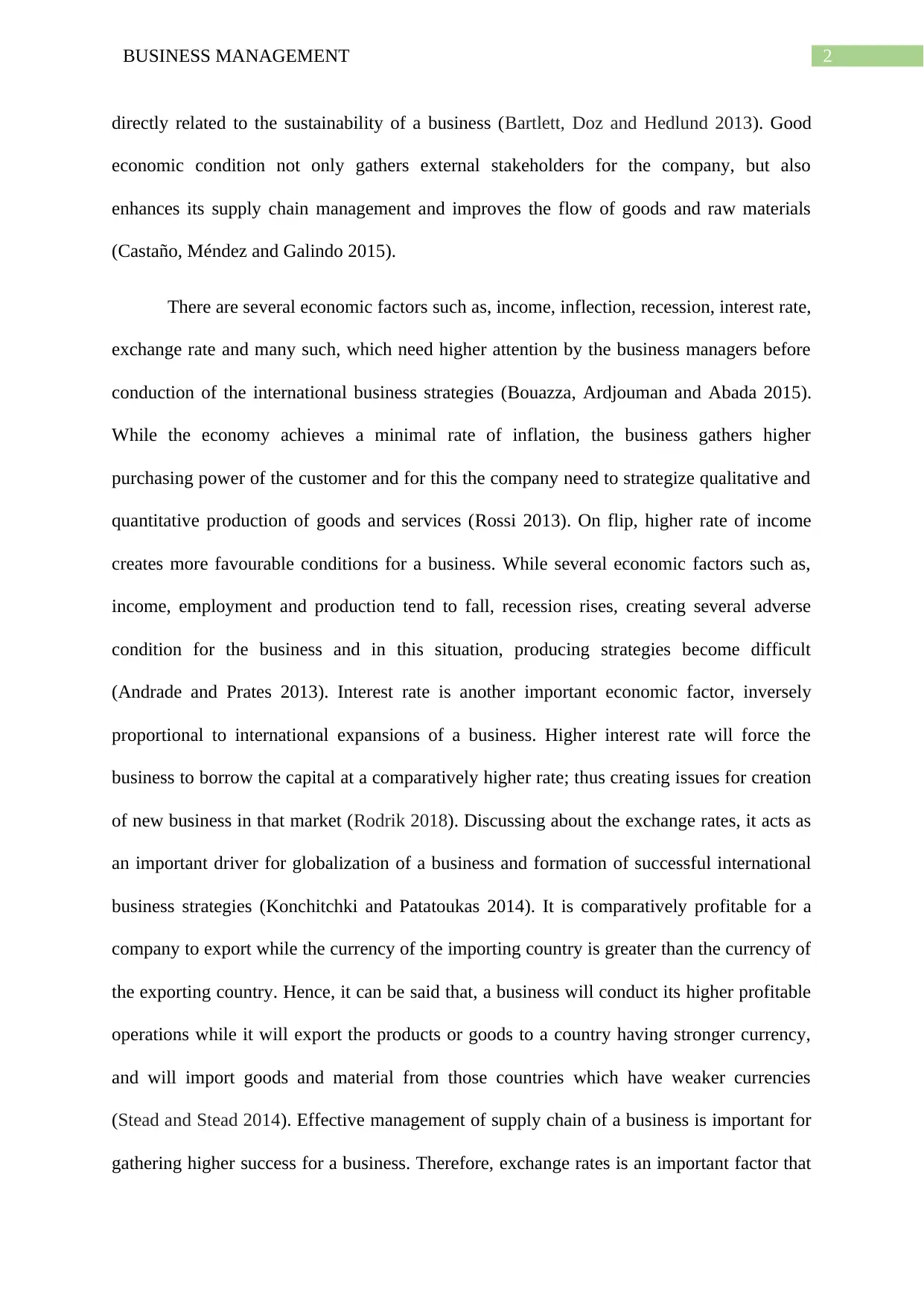
2BUSINESS MANAGEMENT
directly related to the sustainability of a business (Bartlett, Doz and Hedlund 2013). Good
economic condition not only gathers external stakeholders for the company, but also
enhances its supply chain management and improves the flow of goods and raw materials
(Castaño, Méndez and Galindo 2015).
There are several economic factors such as, income, inflection, recession, interest rate,
exchange rate and many such, which need higher attention by the business managers before
conduction of the international business strategies (Bouazza, Ardjouman and Abada 2015).
While the economy achieves a minimal rate of inflation, the business gathers higher
purchasing power of the customer and for this the company need to strategize qualitative and
quantitative production of goods and services (Rossi 2013). On flip, higher rate of income
creates more favourable conditions for a business. While several economic factors such as,
income, employment and production tend to fall, recession rises, creating several adverse
condition for the business and in this situation, producing strategies become difficult
(Andrade and Prates 2013). Interest rate is another important economic factor, inversely
proportional to international expansions of a business. Higher interest rate will force the
business to borrow the capital at a comparatively higher rate; thus creating issues for creation
of new business in that market (Rodrik 2018). Discussing about the exchange rates, it acts as
an important driver for globalization of a business and formation of successful international
business strategies (Konchitchki and Patatoukas 2014). It is comparatively profitable for a
company to export while the currency of the importing country is greater than the currency of
the exporting country. Hence, it can be said that, a business will conduct its higher profitable
operations while it will export the products or goods to a country having stronger currency,
and will import goods and material from those countries which have weaker currencies
(Stead and Stead 2014). Effective management of supply chain of a business is important for
gathering higher success for a business. Therefore, exchange rates is an important factor that
directly related to the sustainability of a business (Bartlett, Doz and Hedlund 2013). Good
economic condition not only gathers external stakeholders for the company, but also
enhances its supply chain management and improves the flow of goods and raw materials
(Castaño, Méndez and Galindo 2015).
There are several economic factors such as, income, inflection, recession, interest rate,
exchange rate and many such, which need higher attention by the business managers before
conduction of the international business strategies (Bouazza, Ardjouman and Abada 2015).
While the economy achieves a minimal rate of inflation, the business gathers higher
purchasing power of the customer and for this the company need to strategize qualitative and
quantitative production of goods and services (Rossi 2013). On flip, higher rate of income
creates more favourable conditions for a business. While several economic factors such as,
income, employment and production tend to fall, recession rises, creating several adverse
condition for the business and in this situation, producing strategies become difficult
(Andrade and Prates 2013). Interest rate is another important economic factor, inversely
proportional to international expansions of a business. Higher interest rate will force the
business to borrow the capital at a comparatively higher rate; thus creating issues for creation
of new business in that market (Rodrik 2018). Discussing about the exchange rates, it acts as
an important driver for globalization of a business and formation of successful international
business strategies (Konchitchki and Patatoukas 2014). It is comparatively profitable for a
company to export while the currency of the importing country is greater than the currency of
the exporting country. Hence, it can be said that, a business will conduct its higher profitable
operations while it will export the products or goods to a country having stronger currency,
and will import goods and material from those countries which have weaker currencies
(Stead and Stead 2014). Effective management of supply chain of a business is important for
gathering higher success for a business. Therefore, exchange rates is an important factor that
⊘ This is a preview!⊘
Do you want full access?
Subscribe today to unlock all pages.

Trusted by 1+ million students worldwide
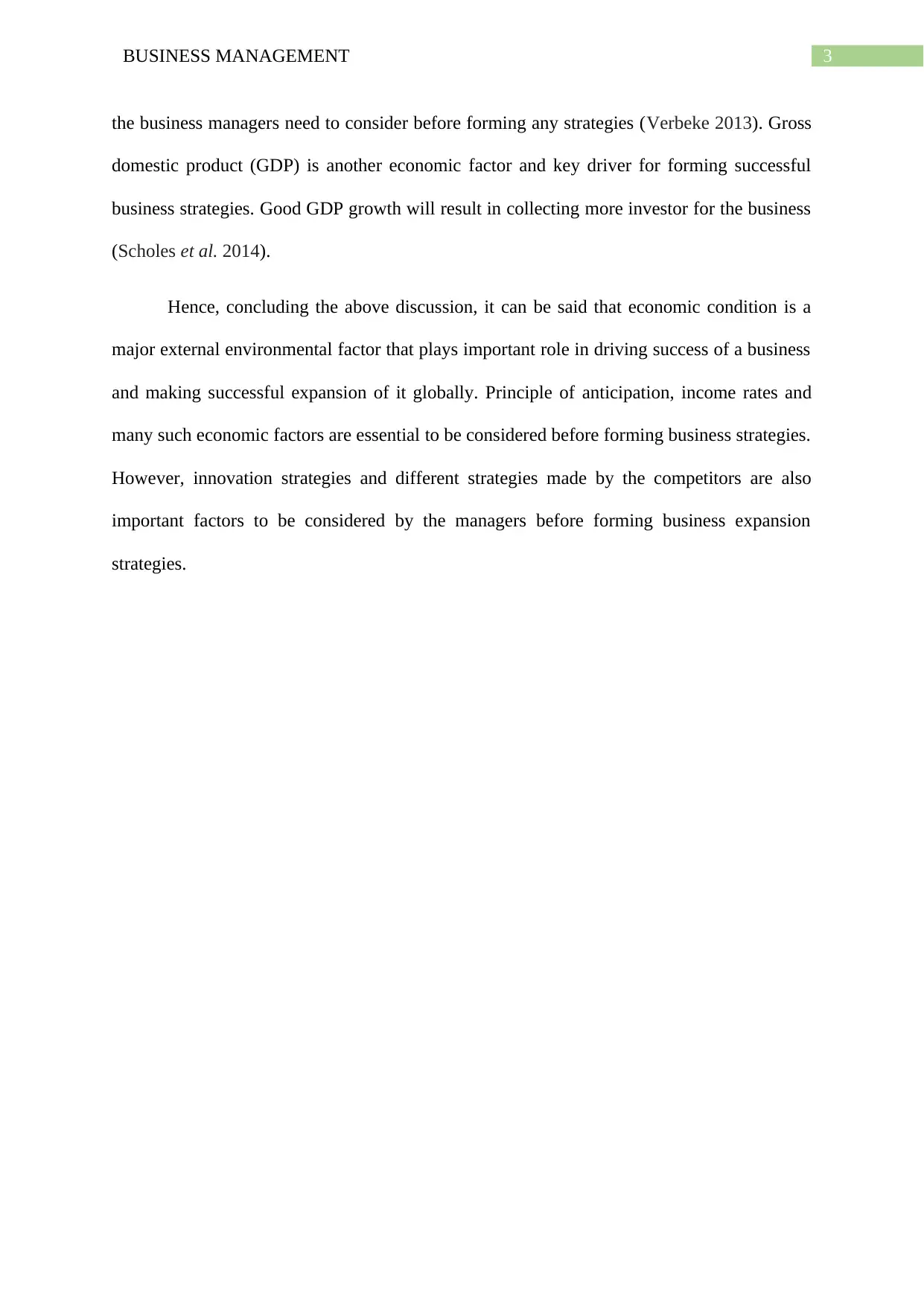
3BUSINESS MANAGEMENT
the business managers need to consider before forming any strategies (Verbeke 2013). Gross
domestic product (GDP) is another economic factor and key driver for forming successful
business strategies. Good GDP growth will result in collecting more investor for the business
(Scholes et al. 2014).
Hence, concluding the above discussion, it can be said that economic condition is a
major external environmental factor that plays important role in driving success of a business
and making successful expansion of it globally. Principle of anticipation, income rates and
many such economic factors are essential to be considered before forming business strategies.
However, innovation strategies and different strategies made by the competitors are also
important factors to be considered by the managers before forming business expansion
strategies.
the business managers need to consider before forming any strategies (Verbeke 2013). Gross
domestic product (GDP) is another economic factor and key driver for forming successful
business strategies. Good GDP growth will result in collecting more investor for the business
(Scholes et al. 2014).
Hence, concluding the above discussion, it can be said that economic condition is a
major external environmental factor that plays important role in driving success of a business
and making successful expansion of it globally. Principle of anticipation, income rates and
many such economic factors are essential to be considered before forming business strategies.
However, innovation strategies and different strategies made by the competitors are also
important factors to be considered by the managers before forming business expansion
strategies.
Paraphrase This Document
Need a fresh take? Get an instant paraphrase of this document with our AI Paraphraser
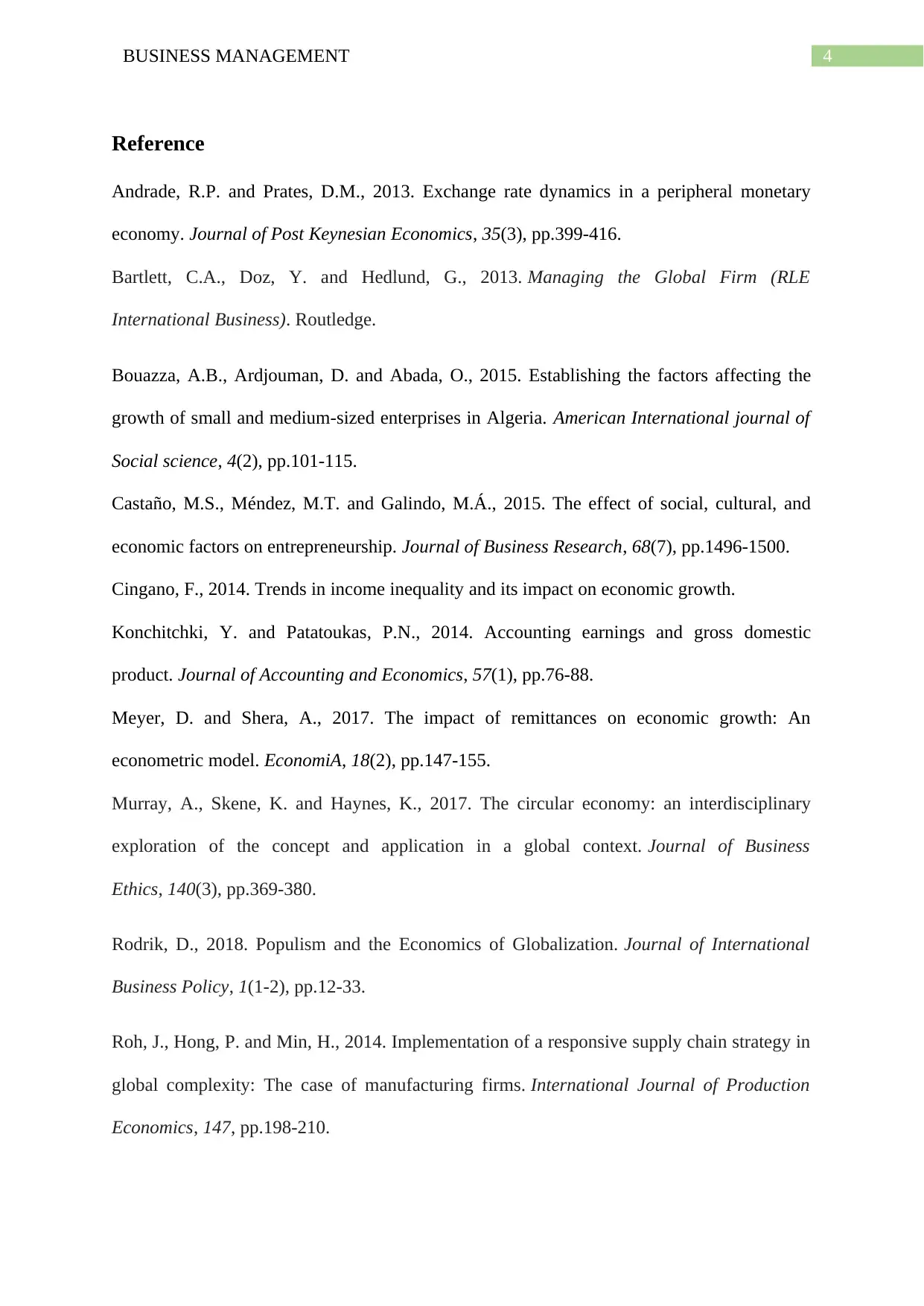
4BUSINESS MANAGEMENT
Reference
Andrade, R.P. and Prates, D.M., 2013. Exchange rate dynamics in a peripheral monetary
economy. Journal of Post Keynesian Economics, 35(3), pp.399-416.
Bartlett, C.A., Doz, Y. and Hedlund, G., 2013. Managing the Global Firm (RLE
International Business). Routledge.
Bouazza, A.B., Ardjouman, D. and Abada, O., 2015. Establishing the factors affecting the
growth of small and medium-sized enterprises in Algeria. American International journal of
Social science, 4(2), pp.101-115.
Castaño, M.S., Méndez, M.T. and Galindo, M.Á., 2015. The effect of social, cultural, and
economic factors on entrepreneurship. Journal of Business Research, 68(7), pp.1496-1500.
Cingano, F., 2014. Trends in income inequality and its impact on economic growth.
Konchitchki, Y. and Patatoukas, P.N., 2014. Accounting earnings and gross domestic
product. Journal of Accounting and Economics, 57(1), pp.76-88.
Meyer, D. and Shera, A., 2017. The impact of remittances on economic growth: An
econometric model. EconomiA, 18(2), pp.147-155.
Murray, A., Skene, K. and Haynes, K., 2017. The circular economy: an interdisciplinary
exploration of the concept and application in a global context. Journal of Business
Ethics, 140(3), pp.369-380.
Rodrik, D., 2018. Populism and the Economics of Globalization. Journal of International
Business Policy, 1(1-2), pp.12-33.
Roh, J., Hong, P. and Min, H., 2014. Implementation of a responsive supply chain strategy in
global complexity: The case of manufacturing firms. International Journal of Production
Economics, 147, pp.198-210.
Reference
Andrade, R.P. and Prates, D.M., 2013. Exchange rate dynamics in a peripheral monetary
economy. Journal of Post Keynesian Economics, 35(3), pp.399-416.
Bartlett, C.A., Doz, Y. and Hedlund, G., 2013. Managing the Global Firm (RLE
International Business). Routledge.
Bouazza, A.B., Ardjouman, D. and Abada, O., 2015. Establishing the factors affecting the
growth of small and medium-sized enterprises in Algeria. American International journal of
Social science, 4(2), pp.101-115.
Castaño, M.S., Méndez, M.T. and Galindo, M.Á., 2015. The effect of social, cultural, and
economic factors on entrepreneurship. Journal of Business Research, 68(7), pp.1496-1500.
Cingano, F., 2014. Trends in income inequality and its impact on economic growth.
Konchitchki, Y. and Patatoukas, P.N., 2014. Accounting earnings and gross domestic
product. Journal of Accounting and Economics, 57(1), pp.76-88.
Meyer, D. and Shera, A., 2017. The impact of remittances on economic growth: An
econometric model. EconomiA, 18(2), pp.147-155.
Murray, A., Skene, K. and Haynes, K., 2017. The circular economy: an interdisciplinary
exploration of the concept and application in a global context. Journal of Business
Ethics, 140(3), pp.369-380.
Rodrik, D., 2018. Populism and the Economics of Globalization. Journal of International
Business Policy, 1(1-2), pp.12-33.
Roh, J., Hong, P. and Min, H., 2014. Implementation of a responsive supply chain strategy in
global complexity: The case of manufacturing firms. International Journal of Production
Economics, 147, pp.198-210.
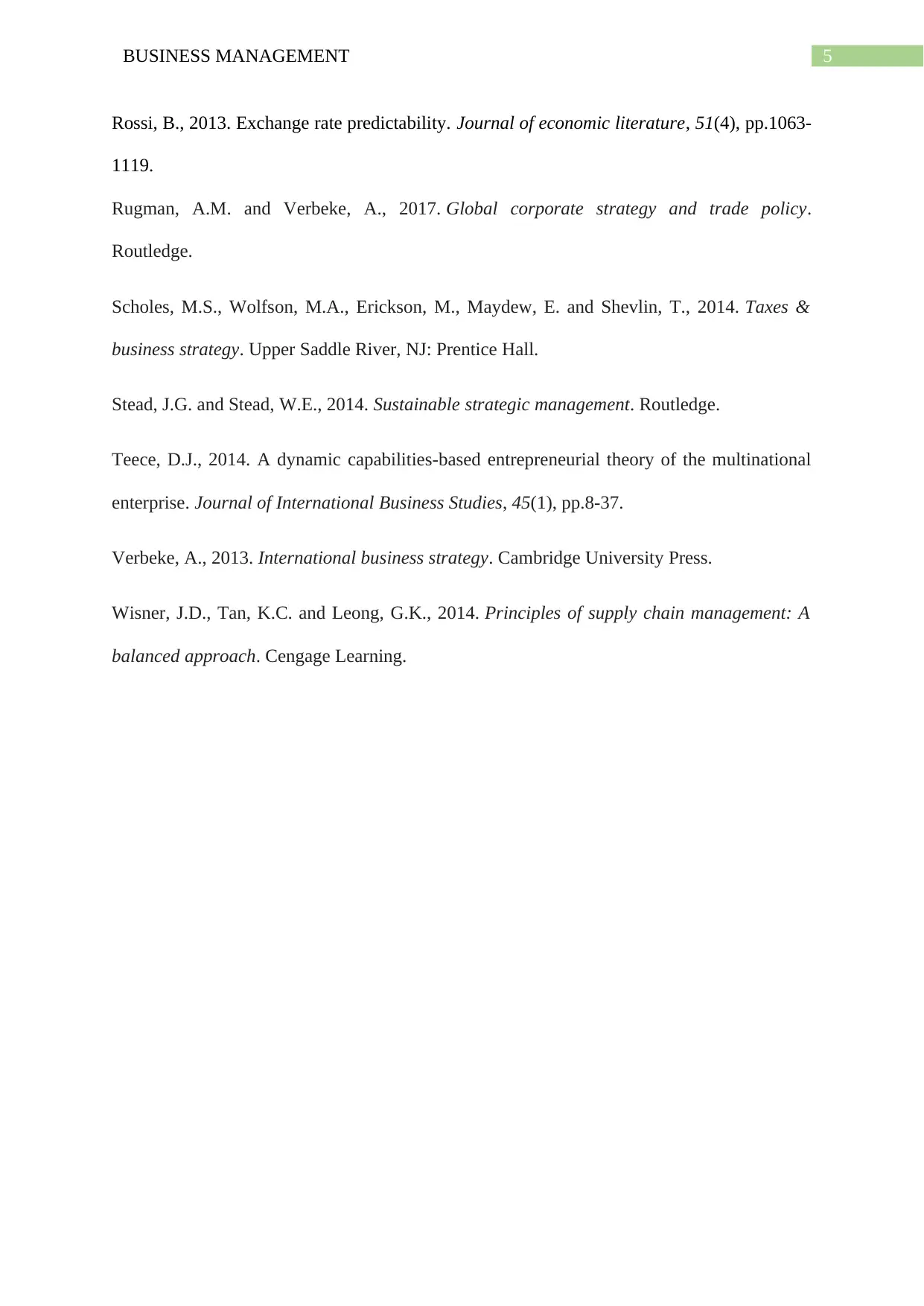
5BUSINESS MANAGEMENT
Rossi, B., 2013. Exchange rate predictability. Journal of economic literature, 51(4), pp.1063-
1119.
Rugman, A.M. and Verbeke, A., 2017. Global corporate strategy and trade policy.
Routledge.
Scholes, M.S., Wolfson, M.A., Erickson, M., Maydew, E. and Shevlin, T., 2014. Taxes &
business strategy. Upper Saddle River, NJ: Prentice Hall.
Stead, J.G. and Stead, W.E., 2014. Sustainable strategic management. Routledge.
Teece, D.J., 2014. A dynamic capabilities-based entrepreneurial theory of the multinational
enterprise. Journal of International Business Studies, 45(1), pp.8-37.
Verbeke, A., 2013. International business strategy. Cambridge University Press.
Wisner, J.D., Tan, K.C. and Leong, G.K., 2014. Principles of supply chain management: A
balanced approach. Cengage Learning.
Rossi, B., 2013. Exchange rate predictability. Journal of economic literature, 51(4), pp.1063-
1119.
Rugman, A.M. and Verbeke, A., 2017. Global corporate strategy and trade policy.
Routledge.
Scholes, M.S., Wolfson, M.A., Erickson, M., Maydew, E. and Shevlin, T., 2014. Taxes &
business strategy. Upper Saddle River, NJ: Prentice Hall.
Stead, J.G. and Stead, W.E., 2014. Sustainable strategic management. Routledge.
Teece, D.J., 2014. A dynamic capabilities-based entrepreneurial theory of the multinational
enterprise. Journal of International Business Studies, 45(1), pp.8-37.
Verbeke, A., 2013. International business strategy. Cambridge University Press.
Wisner, J.D., Tan, K.C. and Leong, G.K., 2014. Principles of supply chain management: A
balanced approach. Cengage Learning.
⊘ This is a preview!⊘
Do you want full access?
Subscribe today to unlock all pages.

Trusted by 1+ million students worldwide
1 out of 6
Related Documents
Your All-in-One AI-Powered Toolkit for Academic Success.
+13062052269
info@desklib.com
Available 24*7 on WhatsApp / Email
![[object Object]](/_next/static/media/star-bottom.7253800d.svg)
Unlock your academic potential
Copyright © 2020–2025 A2Z Services. All Rights Reserved. Developed and managed by ZUCOL.





